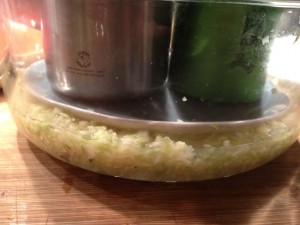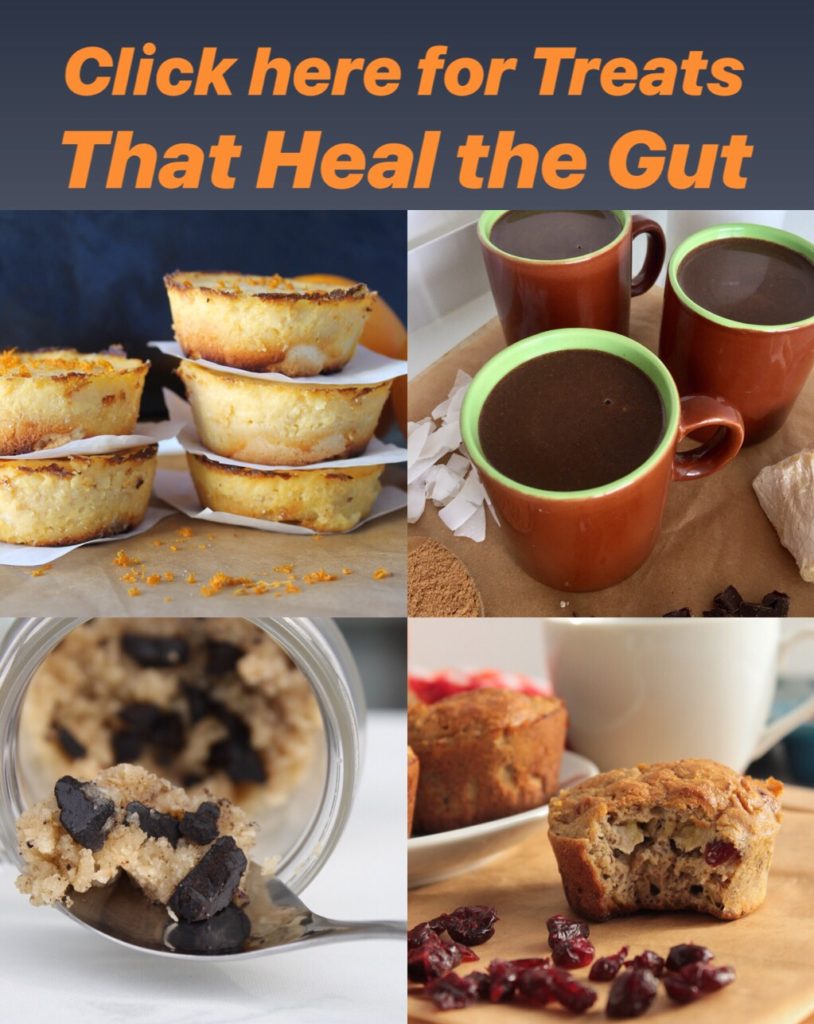What brand of supplements provide the best probiotics dose?
The question I’m most frequently asked, as a digestive health expert, is what are the best probiotics supplements?
The answer is I DON’T KNOW!
Before you fall out of your chair, please let me explain.
I’m not against probiotic supplements but since I don’t take any it’s hard to recommend products I have no personal experience with. I like to test things out before I recommend them to others. And believe it or not, I did not take any probiotic supplements when I was healing my gut.
If supplements are your only option and you want a high quality recommendation, a fellow digestive health coach often suggests Udo’s brand probiotics. And there’s another recommendation later in this article, so stay tuned.

Why don’t I take probiotic supplements?
There are good reasons that I prefer to get my probiotic fix from fermented veggies like sauerkraut, red miso paste and homemade kefir rather than a bottle.
Most people assume that taking a probiotic supplement will cover all their probiotic needs. But they don’t realize (because they’re not digestive nerds like me) that their probiotic pill could be letting the down.
With probiotics from a pill, there are no guarantees. You are gambling with beneficial bacteria.
The strength and efficacy of most probiotic supplements is questionable. The only way to know for sure if you are getting what the bottle tells you is to test it in a lab.
However, if you eat homemade sauerkraut, you know you’re getting the good stuff.
Here are some little-known probiotic basics to help you make the most effective probiotic choices.
Why probiotic pills can be problematic…
You don’t always get what you think you are getting. Because beneficial bacteria is alive it can be killed by too much time on the shelf in the wrong conditions, during the shipping, handling process or manufacturing process, or by extreme temperatures.
Also according to the book, Listen to Your Gut by digestive expert Jini Patel, you may not be getting all the strains listed on the probiotic bottle. She says that probiotic strains often compete for dominance and can crowd out or kill the weaker strains.
To solve this problem she recommends using Natren’s Healthy Trinity probiotic supplements. These pills are expensive because they use a special process to keep the strains separated from each other.
Additives. Because probiotic supplements have other ingredients in them like additives, preservatives, prebiotics and binders you are ingesting extra stuff you don’t need.
Allergies. People with food allergies can inadvertently buy supplements that contain GMO products, gluten, lactose, or soy.
Lack of regulation. There is no regulatory body, like the FDA, that regulates the claims of supplements. Supplement companies can make unverified claims on their packaging.
Dosage control. Some people experience cramping, bloating or worsening of their digestive symptoms when they take probiotics. This could be the result of bad bacterial die off or probiotic intolerance.
You can overcome these issues by greatly reducing your daily probiotic dose in the beginning. Start with tiny but tolerable amounts and slowly build up over time. It can be hard to break capsules into small enough doses, but fermented veggies, can be easily eaten in very small increments.
Over-supplementing. Overdosing on probiotics,is not usually harmful. But in rare instances, it may cause an overgrowth of bacteria in the small intestines. It is much easier to over supplement with pills than with sauerkraut (unless you really, really LOVE sauerkraut).
Expense. Supplements are much more expensive than making your own fermented foods. Salting some shredded cabbage and putting it on your counter for 3 days, to make DIY sauerkraut, will save you cash.
What if probiotic foods are not tolerated?
If probiotic foods are not tolerated, even in tiny amounts, the next best thing is probiotic powder, which can be dosed with ease and is likely to have fewer fillers and binders than pills.
Ever wonder how probiotic supplements are made in the lab?
It’s not pretty. Most starting cultures are extracted from human infant poop, then cleaned up and propagated in the lab. If more people knew that, perhaps they wouldn’t be popping those pills like candy.
Not all probiotic foods are created equal
Kombucha tea is fermented through a yeast fermentation process (versus bacterial fermentation for veggies). Yeast fermented foods produce a small amount of vinegar and alcohol as a by-product and are not recommended for people who have issues with yeast overgrowth (Candida), are diabetic or have an alcohol sensitivity.
Despite the fact that kefir can be a powerful source of probiotics, some people can’t tolerate fermented dairy. Not even fermented goat dairy. The problem is most likely casein, the protein found in dairy.
AND even more surprisingly….
The probiotics found in yogurt do not implant in the digestive tract. This can be remedied by adding live cultures to the yogurt after the fermentation process is complete. Most commercial yogurt brands don’t have active probiotic strains, despite their labeling.
One way to increase weak probiotic content in yogurt is simply to leave it sitting out on the counter for several hours. The most sour the taste, the most good bugs there are.
Fermented veggies are the best source of flora-building probiotics, and if you don’t want to make your own then make sure to buy a raw and unpasteurized brand for the best benefit. Sauerkraut is also a good source of vitamin C.
When probiotics backfire. An extreme bacterial imbalance complicated by a severe Candida infection, histamine intolerance, cancer or other types of severe infection can prevent the body from benefiting from any form of probiotics. In these severe cases probotics can become food for yeast and parasites.
A cutting edge therapy, called fecal transplant, is often used for severe cases, intolerances and antibiotic resistance. I have previously written about the topic here.
What’s so bad about bad bacteria?
Probiotics are the good bacterial “soldiers” that keep the bad bacteria from growing out of control. Bad bacteria wreaks havoc on the body by excreting toxins that are hard on our bodies and tax the liver to work extra hard to filter the toxins.
Chronic exposure to these bad bacterial toxins can create the chronic inflammation associated with many digestive and other health conditions. This inflammation is believed by some to be the underlying cause of food allergies.
Because of this, I believe restoring proper bacterial gut balance can reverse food allergies. I’ve personally reversed my food allergies and have read about others who have done the same.
What do probiotics do?
Probiotics are the line of defense that protect us from foreign invaders like viruses, parasites and fungus. Beneficial bacteria are the crucial building blocks of a strong immune system, which is primarily located in the gut.
A healthy bacterial balance can heal environmental allergies, protect from cancerous tumor growth, produce essential vitamins, and helps us digest plant-based fiber by producing an enzyme called cellulose.
I theorize that a lack of beneficial bacteria can cause some people with IBS to have problems digesting high fiber cruciferous veggies like cauliflower, broccoli and kale.
Natural antibiotics
A combination of antibiotics, stress and high sugar foods are the culprits that can skew our bacterial balance over to the dark side.
If you absolutely must take antibiotics (sometimes there is no way around it) remember to eat lots of probiotic foods afterwards and if you have a good probiotic supplement, you can add that in for additional support.
Lowering sugar and stress levels in the weeks following an antibiotic course can help you regain a healthy bacterial balance.
If antibiotics are suggested, but not required, consider taking nature’s antibiotic powerhouses, oregano oil and garlic instead.
Now you know more about probiotics than most humans. You are still welcome to take your probiotic supplement but make sure to add in some fermented foods for extra insurance!
Tell me in the comments what your favorite probiotic source is….
 Angela Privin is proof that IBS is NOT an incurable disease or a disease at all. IBS is a body out of balance. It’s an invitation for change. After solving her own IBS mystery more than a decade ago Angela trained as a health coach to help others.
Angela Privin is proof that IBS is NOT an incurable disease or a disease at all. IBS is a body out of balance. It’s an invitation for change. After solving her own IBS mystery more than a decade ago Angela trained as a health coach to help others.
Angela uses both science and intuition to help people figure out what’s out of balance in their body. She works with lab tests, dietary changes, supplementation and nervous system rebalancing. Get help rebalancing your digestive system and solving your IBS mystery here.






Pingback: How to avoid infectious disease
Pingback: 30 Ways To Improve Digestion and Gut Health (Part One) • MTHFR Living
Pingback: Roadmap for healing IBS